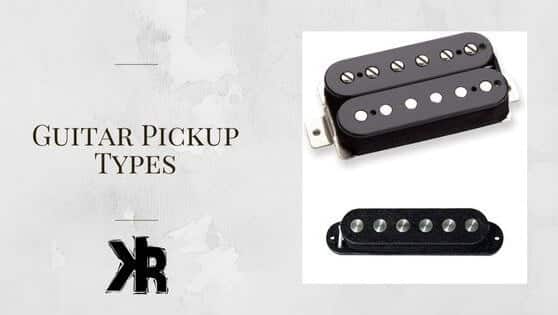Table of Contents
There are no other components as crucial to an electric guitar’s tone as the pickup. The vibrations of the strings are converted into an electrical signal by the pickup. This signal is then sent to an amplifier or other device.
There are numerous varieties of pickups on the market. And each have specific tone and output differences.
Your preference for pickups will mostly be influenced by the genre of music you play. Along with your own tastes, of course.
But with so many types of guitar pickups to choose from, how do you know which one is right for you? In this Killer Rig article, we’ll break down the different types of pickups. We will also help you find the right one for your music style.
Types of Electric Guitar Pickups
When it comes to electric guitar pickups, there are many shapes, sizes, and sounds available. This is a very important part.
Single-Coil Pickups
Single-coil pickups are the most common type found on electric guitars. They were first introduced in the 1930s and have been used on some of the most iconic guitars ever made.
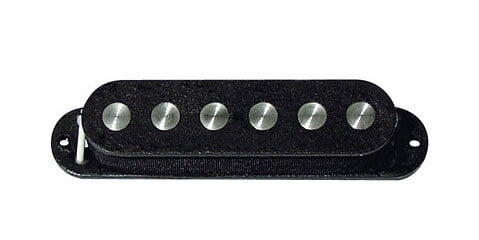
Single-coil pickups are known for their bright, clear sound with plenty of attack. They’re perfect for genres like country, pop, blues, and rock because of their spanky, tight tone.
Wire is wound around a set of metal poles, one for each string, to create single coils. In this scenario, there is just one coil, which is vital to understand.
Each pole comes into touch with a magnet on the pickup’s bottom side. It provides the magnetic flux field used to pick up the vibrations created by the strings.
| Advantages | Disadvantages |
|---|---|
| Bright, Clear Sound | Noisy |
| Good Attack | Can Be Microphonic |
| Versatile | Thin Sounding |
One of the main disadvantages of the single-coil design is the buzz and hum they produce. They are susceptible to electromagnetic interference.
Guitars With Single-Coil Pickups
- Fender Stratocaster
- Fender Telecaster
- Schecter Hellcat
Humbucker Pickups
Humbuckers were invented in the 1950s. This was a way to combat the noise produced by single-coil pickups.
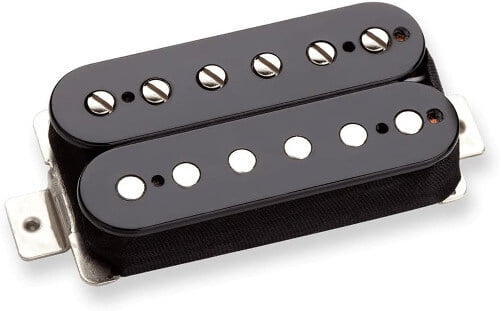
They are made up of two coils of wire that are wrapped around separate magnets. The coils are connected in a series. This cancels out the electromagnetic interference and produces a much smoother tone.
Humbucker pickups are recognized for their rich, full sound with plenty of mid-range. They’re perfect for genres like heavy metal, hard rock, and jazz.
This is because of their thick, creamy tone in both the bridge and neck positions.
You will also find that artists in genres like blues, and pop will also use them for their warm tones.
Some guitars come with coil taps that allow the player to separate the two windings. With the pull of a knob, you can switch between single-coil and humbucker tones.
| Advantages | Disadvantages |
|---|---|
| Rich, Full Sound | Can be muddy sounding |
| Less Noise | Take up more space |
| Higher Output | Can lack brightness |
When a very dark-sounding humbucker is placed on a guitar with mahogany wood. It can be so dark that the tone can become muddy.
Guitars With Humbucker Pickups
- Gibson Les Paul
- ESP LTD EC-1000
- PRS SE Custom 24
Want to learn more about guitar pickup magnet types? Click Here!
Mini Humbuckers
Mini humbuckers are a variation of the traditional pickup. They were first introduced by Epiphone in the 1970s. They quickly gained popularity among players who wanted the tone of a humbucker. But in a smaller package.
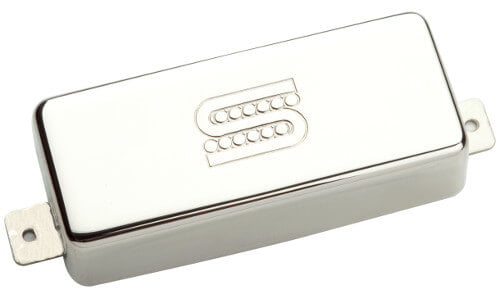
Mini humbuckers are made with smaller magnets and coils. This gives them a brighter, clearer sound with less thickness.
They’re perfect for genres like country, pop, and blues because of their twangy, biting tone.
Many players feel their sound falls in between a single-coil pickup and a humbucker. The extra bit of warmth and the lack of buzz makes them a great option over the use of single-coils. Especially when you tweak your guitar controls like tone and volume.
| Advantages | Disadvantages |
|---|---|
| Articulate Tone | Can sound thin |
| A bit warmer than single-coils | Lower output |
| Great clean sounds | Guitar cavity may be too small |
Guitars With Mini Humbuckers
- Epiphone Firebird
- Gretsch Electromatic
P90 Pickups
Gibson first made P90 pickups available in the 1940s. They swiftly rose to the status of one of the most well-known models ever.
They are well renowned for their aggressive, bright sound. Their rough, abrasive tone makes them ideal for styles like rock, blues, and punk.
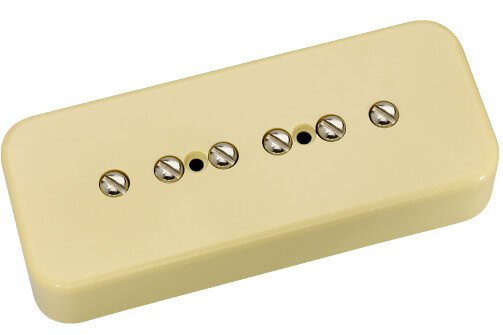
P90 pickups are made in the same manner that single-coils are, except for the bobbin and case. As a result of the larger parts and a different type of winding. The P90 has more output than a single-coil, but not as much as a humbucker.
This puts the P90 in a class all its own, and even to this day they are still sought after in certain music genres.
| Advantages | Disadvantages |
|---|---|
| Gritty, bright Tone | Can be noisy |
| Decent attack | Low output |
| Edgy sounds | Easily mistaken for humbuckers |
Because they are made in the same fashion as regular single-coil pickups, they hum and buzz the same way.
Guitars With P90 Pickups
- Fender Noventa Telecaster
- Gibson Les Paul Special
- Gretsch G-2262T Streamliner
Further Learning: How do guitar pickups work?
Acoustic Guitar Pickups
There are many types of acoustic guitar pickups. But the most common are piezo, in-body microphones, and magnetic sound hole devices.
Piezo Pickups
Piezo pickups are small ceramic discs that sit under the saddle of an acoustic guitar. They translate the string vibrations into an electrical signal.
They are known for their natural, acoustic sound and are often used in live performances.
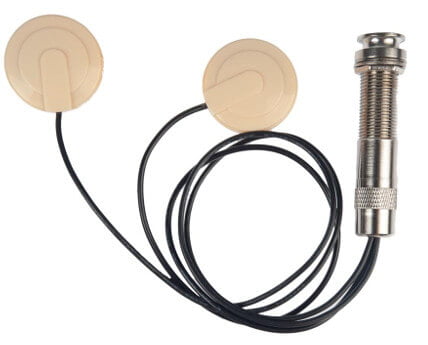
Piezo pickups do not use magnetic energy to translate vibrations. Instead, they measure the actual vibration of the saddle and instrument.
All with a transducer to produce the signal. This is great for guitars that do not use steel strings, as magnetic pickups are useless.
There are no magnets in the Piezo design. The hum and noise are also not anything to have to worry about like a single-coil pickup.
| Advantages | Disadvantages |
|---|---|
| Natural, acoustic sound | Sound can be quacky |
| Noise free | Less versatile |
| Works with all string types | Installation can be tough |
Magnetic Acoustic Pickups
Magnetic acoustic pickups are devices that attach to the soundboard of the guitar. They use a conventional force to translate the vibrations into an electrical signal. They are known for their versatility and ability to be used in a wide range of genres.
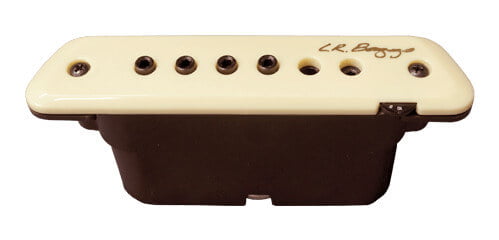
Magnetic pickups can only be used with steel-string acoustics. The technology will not work with nylon or gut options.
They are also known to add a bit of color to the sound, as they are often made with Alnico magnets.
Alnico is an alloy made of Aluminum, Nickel, and Cobalt, and is known for its specific tone.
| Advantages | Disadvantages |
|---|---|
| More Versatile | Only works with steel-string acoustics |
| Can be used in a wide range of genres | Not as natural sounding as piezo pickups |
| Adds warmth to the tone | Not many options |
In-Body Microphones
In-body microphones are placed inside the belly of an acoustic guitar. They are recognized for their natural sound and are often used in live performances.
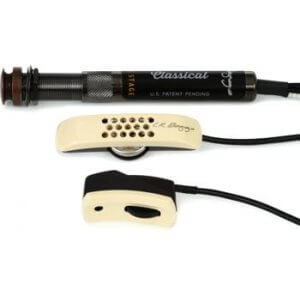
In-body microphones work by translating the string vibrations. They turn it into an electrical signal that is then amplified.
They are placed inside the guitar. Because of this, there is a good chance of feedback and instability if not installed right.
But because they are a microphone, the tone is more natural. So the acoustic qualities are captured and amplified. Any percussive playing or tapping on the soundboard will also be amplified.
| Advantages | Disadvantages |
|---|---|
| Natural sounding | Can be difficult to install |
| Amplifies Percussive playing | Feedback prone |
| Easy To Get | Expensive |
Bass Guitar Pickups
Electric bass guitar pickups come in a few different varieties. But the most common are passive and active.
P-Style Pickups
P-Style or precision pickups are one of the most common types for electric bass guitar. They are passive, meaning they do not require a battery to work and consist of two halves.
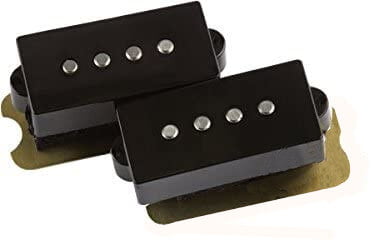
One P-Style pickup half is placed higher up on the bass’s body than the other. This will enable the lower strings to utilize higher frequencies. All while allowing the two higher strings to produce a deeper tone.
They each use two magnetic poles, or slugs per string, to generate the signal. This provides a consistent output on each string no matter how it is being played. The slugs are wrapped in copper wire, and then each assembly is placed into its own housing.
P-Style pickups are known for their bright, punchy tone and are often used in jazz, funk, and even hard rock music.
| Advantages | Disadvantages |
|---|---|
| Hum canceling design | Not as versatile as other types of pickups |
| Bright, punchy sound | This design is somewhat limiting |
J-Style Pickups
P and J-Style pickups are comparable. They have two magnetic poles, sometimes known as slugs, per string and are passive. They are also installed on the bass’s body, though differently.
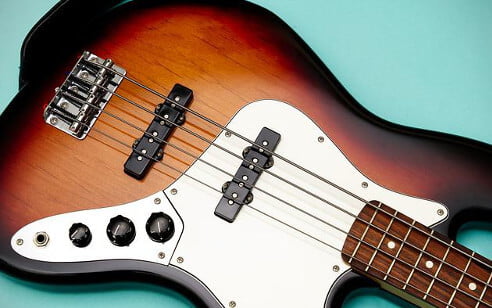
With J-Style pickups, the slugs are placed side-by-side rather than one on top of the other. This gives them a wider magnetic field to work with and results in a fuller sound.
The J-Style pickup is also known for its Growl which is a result of the way the string vibrates against the slugs.
This can be an advantage or a disadvantage depending on the style of music you are playing.
The J stands for jazz. There are many players even from metal and rock that use this pickup because of its versatility.
| Advantages | Disadvantages |
|---|---|
| Versatile when used in pairs | The single-coil design is noisy |
| Thick and full | Not great as a single |
Noiseless Jazz Style Pickups
Noiseless J-Style pickups are intended for jazz basses, as the name would imply. But can be used in a variety of styles. They are humbucking passive pickups that eliminate any background noise.
Noiseless Jazz Pickups are J-Style. To lessen the amount of interference, they have been modified. They achieve this by using two coils that are out of phase with each other.
This makes the pickup quieter and less likely to feedback. They still have the J-Style pickup growl. Nonetheless, without the annoying noise.
| Advantages | Disadvantages |
|---|---|
| Quieter than standard J-Style | More expensive than standard pickups |
| Less prone to noise | Not quite the same sound as regular J-style |
Dual Coil Bass Pickups
Dual coil bass pickups are similar to the precision and jazz style. They also have two magnetic poles per string. Yet, they differ in that they have two coils of copper wire rather than one.
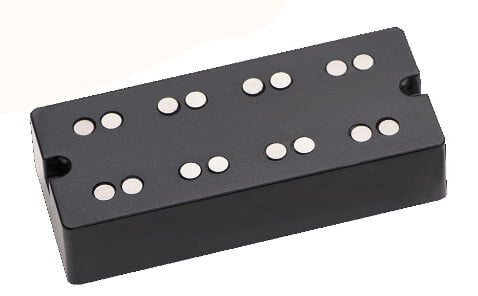
This results in a louder and fuller sound as there is more surface area for the string to vibrate against.
It also means that they are less susceptible to interference and noise. This is because they are designed like a humbucker.
Dual coil pickups are often used in rock and metal styles of music, as they can provide a very fat sound. But because they are more harmonically rich, they are used in all sorts of musical genres.
| Advantages | Disadvantages |
|---|---|
| Loud and full tone | More expensive |
| Less susceptible to interference and noise | Highs are slightly attenuated |
| Can be used in a variety of genres | Not ideal for all music genres |
Soap Bar Bass Pickups
Soap bar pickups get their name from their rectangular shape that resembles a bar of soap. They are one of the most popular types of pickups as they are very versatile and can be used in a wide range of styles.
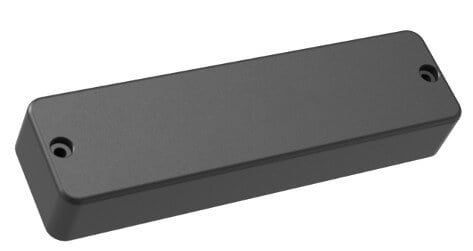
Soap bar pickups are passive units that use either a single or dual coil design. This will then determine which music style they will fit best, as only the case differs in this regard. This can be hard to determine as you cannot see the pole pieces.
In most cases, they will be a dual coil design. Yet, with full tonal characteristics and higher output levels.
Active Pickups
These are a type of pickup that uses an active preamp to boost the signal. This results in a louder and clearer sound as well as less noise and interference.
You will find that there are active pickups made for all guitar types. All from single-coil size to the mighty humbucker.
They rely on battery power to work properly. So some manufacturers either have one built-in or need it changed occasionally.
Active Pickups For Guitar
While active pickups can be used on any guitar, they are most commonly used on electric models. This is because they need battery power and so are not as practical for use on acoustic guitars.
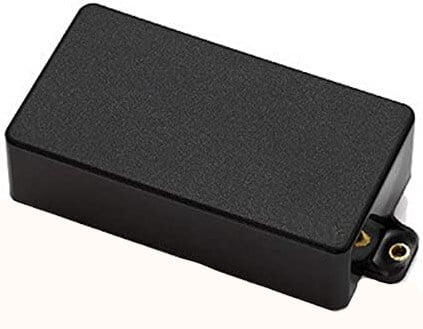
Active pickups come in a wide variety of designs for various musical genres. Some are made to mimic the single-coil pickup’s frequency range.
They are made to offer an abundance of the chime and brightness you would anticipate. Yet without the noise that a single coil typically makes. However, some designs might be harsh and lack definition.
Then there are the humbucker-style active pickup models. Some are made to be very hot, meaning the output is well above that of a passive.
Sometimes this can mean that they don’t sound like you may have hoped. They begin to lack clarity in their tonal character.
A well-designed active pickup on the other hand can sound well-defined. It can provide exceptional sustain and the perfect output. Some companies are better at active pickups than others.
Click here to see 60 guitars with active pickups!
Active Bass Pickups
Bass pickups are also available, and these use an active preamp to control the output signal. This results in a louder, clearer tone with less noise and interference.
Many types of active bass pickups are designed for different styles of music. For example, some provide a very punchy sound that is perfect for funk or R&B.
Others are designed to replicate the sound of a passive pickup. They provide plenty of warmth and fullness that you would expect.
FAQs
What is better P90 or humbucker?
There is no definitive answer as to which is better. It depends on your personal preference and the type of music you play.
If you want a fuller sound, then a humbucker would be better. Whereas if you prefer a brighter, grittier tone, then a P90 would be more suitable.
What is the best guitar pickup for metal?
The best guitar pickup for metal would be a high-output humbucker. This will provide you with the full, heavy sound that you need.
Sometimes this can be either active or passive, it just depends on the sound you are shooting for.
Are active pickups worth it?
Active pickups are worth it if you are looking for a louder, clearer sound. They provide less noise and interference.
They are voiced differently than passive pickups. They don’t quite respond the same way when you roll down the volume.

